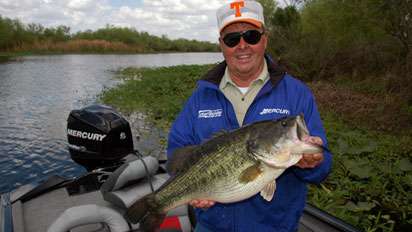
I recently filmed a promotional clip for the Tennessee Wildlife Federation’s Hunt and Fish Tennessee campaign, and you can see it at their Web site. Rest assured, the importance of preserving our fishing and hunting heritage is fresh in my mind.
For most Americans, the opportunity to participate in these great sports is a privilege — not a right. And that means this privilege could come under attack, or perhaps even be taken away, by anti-hunting and fishing groups.
Sure, some may say, “That can’t happen.” Well, that’s wrong. There are several examples of such threats to fishing and hunting. Never mind that these sports have been a part of our country since it was founded.
This very real threat is why 14 states have already passed amendments protecting the right to fish and hunt. Four more have like amendments on upcoming ballots while 8-10 other states are in the process of forming similar amendments for their own constitutions. *
My home state of Tennessee will vote on the amendment on November 2.
Though outdoor opportunities are considered mostly recreation for many, we can’t deny it’s also big business. These sports have grown to be vital to our economy, annually contributing $76 billion according to current statistics.
If a single corporation grossed as much as hunters and anglers spend, it would be among America’s 20 largest, ahead of Target, Costco and AT&T. Data provided by the Tennessee Wildlife Federation says hunters and anglers create an economic “ripple effect” of $192 billion a year. It keeps people working — not just in typical fishing and hunting jobs, but also in gas stations, retail, restaurants and hotels throughout every state and congressional district of the USA.
Surveys also indicate anglers and hunters are a significant voting bloc. In fact, their voting potential was 31 percent of all votes cast in the 2004 presidential election. Eighty percent of sportsmen are “likely voters,” far more than the national average.
We (anglers and hunters) have historically been — and continue to be — the largest contributors to government wildlife conservation programs. Through excise taxes and license revenues, we’ve contributed more than $10 billion to conservation, and annually provide more than 80 percent of the funding for most state fish and wildlife agencies.
Thanks to fuel taxes, the Federal Sport Fish Restoration and Boating Fund now receives $570 million a year from boaters, used mostly for coastal wetlands and fisheries conservation.
According to the most recent surveys, the American public has an overwhelmingly positive attitude toward outdoor sports. Americans understand that fishing and hunting serve multiple needs — sustenance, recreation and conservation.
Still, none of us should take it for granted. If a right-to-hunt-and-fish amendment is on your ballot this fall, vote YES. If it has already passed in your state, congratulations! If nothing is being done in your state to create this right, call, e-mail or write your representative and stress the importance of securing the right to fish and hunt in your state.
*
States that have already passed amendments protecting the right to fish and hunt: Alabama, California, Georgia, Louisiana, Minnesota, Montana, New Hampshire, North Dakota, Oklahoma, Rhode Island, Vermont, Virginia, West Virginia and Wisconsin.
States that have amendments on upcoming ballots: Arizona, Arkansas, South Carolina and Tennessee.
States that are in the process of securing this right: Missouri, Idaho, Michigan, New Jersey, Pennsylvania and South Dakota.
For more words of wit and wisdom from one of our sport’s greatest legends, check out www.billdanceoutdoors.com.

